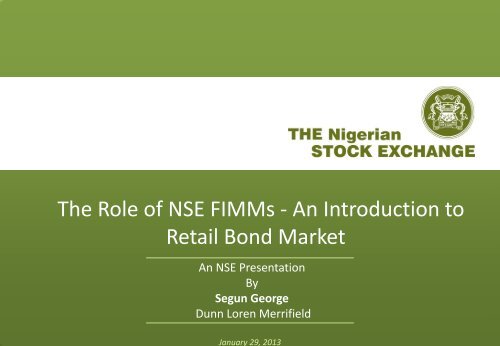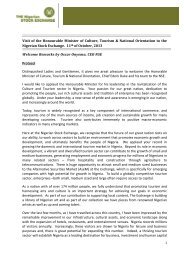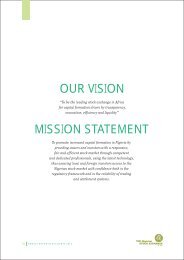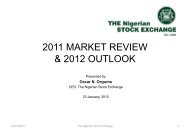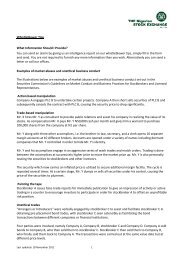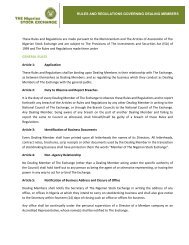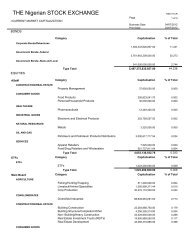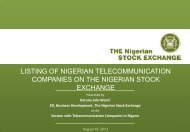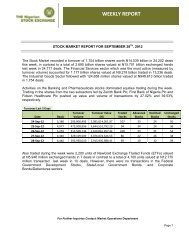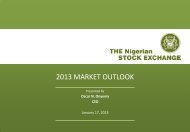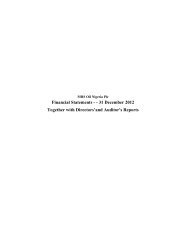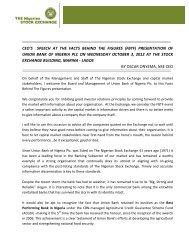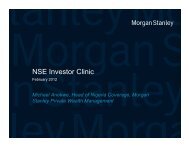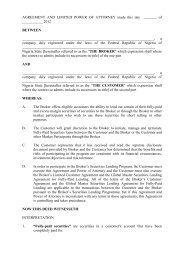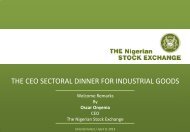An Introduction to Retail Bond Market - The Nigerian Stock Exchange
An Introduction to Retail Bond Market - The Nigerian Stock Exchange
An Introduction to Retail Bond Market - The Nigerian Stock Exchange
- No tags were found...
You also want an ePaper? Increase the reach of your titles
YUMPU automatically turns print PDFs into web optimized ePapers that Google loves.
January 29, 2013<strong>The</strong> Role of NSE FIMMs - <strong>An</strong> <strong>Introduction</strong> <strong>to</strong><strong>Retail</strong> <strong>Bond</strong> <strong>Market</strong><strong>An</strong> NSE PresentationBySegun GeorgeDunn Loren Merrifield
Outline1• <strong>The</strong> <strong>Nigerian</strong> <strong>Bond</strong> <strong>Market</strong>2• What is retail bond market trading & fixed income marketmaking (FIMM)3• How do you participate4• Benefit of trading on the <strong>Exchange</strong>5• Conclusion<strong>The</strong> <strong>Nigerian</strong> S<strong>to</strong>ck <strong>Exchange</strong>2
THE NIGERIAN BOND MARKET: AN OVERVIEW• Prior <strong>to</strong> 2002, the management of the country’s debt position was undertaken by the Federal Ministry ofFinance (FMoF) and the Central Bank of Nigeria (CBN)• During this period, the CBN acted as the main issuer of government debt with issues mainly of expensive shorttenured securities in the form of treasury bills, which translated in<strong>to</strong> a high cost of refinancing and frequentrollovers as open market securities were used <strong>to</strong> finance long-term government needs. Effectively a financingmis-match• Following a restructuring of the domestic debt markets, the Debt Management Office (DMO), which wasoriginally established in 2000 <strong>to</strong> centrally coordinate the management of Nigeria’s debt, resumed the issuanceof longer tenured bonds in 2003 which resuscitated the bond market while CBN was mandated <strong>to</strong> act as theIssuing House and the Registrar• This recorded significant success as there was a paradigm shift away from short-term Treasury Bills <strong>to</strong> longertenor instruments with maturities of up <strong>to</strong> 20 years. Principally, maturing short term treasury bills wererefinanced in<strong>to</strong> longer term bonds starting from 2 <strong>to</strong> 3 years; then, 5, 7, 10 and 20 years. Nigeria now has a 20-year yield curve• <strong>The</strong> appointment of Primary Dealer <strong>Market</strong> Makers (PDMMs) further developed the primary and secondarymarket for FGN bonds in providing liquidity <strong>to</strong> on-the-run bonds across the curve• <strong>The</strong> <strong>Nigerian</strong> bond market has witnessed significant growth over the years <strong>to</strong> emerge as one of the most liquidbond markets in Sub-Sahara Africa (SSA) – ex. South Africa, supported by a considerable increase in marketcapitalization and turnover
THE NIGERIAN BOND MARKET: FOOTPRINTS IN TIME20032006200820102012-Failed offer(variousdocumentedreasons)- callable bonds:3Y, 5Y, 7Y &10Y bonds-15 PDsappointed- 5Y & 7Yissues-Issuance of20Y bondsRelease ofnew guidelinesfor the FGN<strong>Bond</strong> <strong>Market</strong>Addition ofFGN <strong>Bond</strong>s<strong>to</strong> the JPMorgan’s &Barclays EM<strong>Bond</strong> IndexDMOestablished(4 th Oct, 2000)Smaller issues of2Y &3Y- Regular monthlyissuance ofoption-free bonds- 5 additionalPDs appointed-1st re-opening ofexisting bond- Re-appearanceof 10Y bonds1 st recordedmarket shutdown due <strong>to</strong>price volatilityIssuance of the$500m Eurobond(For internationalPrice Discovery):current yield is3.65%(11/01/13)20002005 2007200920114
THE NIGERIAN BOND MARKET: MAJOR EVENTSNIGERIA: COMPOSITION OF GOVERNMENT DEBT – 2001 VS. 20122002: c.N5.1 trillion 2012 (Sept.): c.N6.3 trillion #Treasurybonds*, 36%FGN bonds, 61%Others, 20%LT s<strong>to</strong>ck, 1%Treasury bills, 34%Treasury bills,44%Treasury bonds, 5%#<strong>The</strong> growth in actual new issuance is c.N1.2trillion as most of the issuance was <strong>to</strong> refinance existing T-bills.* Nigeria’s sovereign bonds (debt) have been in existence since the 1970s. However, the Treasury bonds are federalgovernment securities issued pre-2003. <strong>The</strong>y are illiquid and redeemable only <strong>to</strong> the Central Bank of Nigeria (CBN) uponmaturity.5
Feb-06Aug-06Feb-07Aug-07Feb-08Aug-08Feb-09Aug-09Feb-10Aug-10Feb-11Aug-11Feb-12Aug-12THE NIGERIAN BOND MARKET: BONDMARKETNIGERIA: COMPOSITIONSIZINGOF BOND MARKETFGN,86.0%States,10.6%Corporates,3.4%<strong>The</strong> federal government is theprimary issuer of debt. <strong>The</strong>current portions for States andCorporates was achieved undera favourable interest rateregime when primary marketactivities for these tiers ofcredit issuers was beginning <strong>to</strong>gain traction.NIGERIA: BOND MARKET TURNOVER, N’TRILLIONS3.02.52.01.51.00.50.0Trend lineHis<strong>to</strong>rically, volumes had asteep upward trajec<strong>to</strong>ry giventhe dearth of investiblesecurities in Nigeria,particularly after the equitymeltdown of 2008. Followingthe subsequent bond marketcorrection of 2010, volumeshave been on the increasewhile the overall trend ispositive (see Trend line)7
Sub-Nationals (State <strong>Bond</strong>s)IssuerIssueSize(N’bn)RatingMaturityOriginalTenorSub-NationalsTTM/ Av. LifeCoupon(%)Mid-Price Yield (%)Lagos-1 (S1) 50.00 A+, AA, Feb-14 5 1.06 13.00 100.64 12.32Kwara 17.00 A Aug-14 5 1.54 14.00 101.16 13.13Niger # 6.00 A- Oct-15 5 1.83 14.00 100.59 13.61Ebonyi # 16.50 A Sep-15 5 2.50 13.00 99.74 13.26Kaduna 8.50 A+ Aug-15 5 2.61 12.50 97.95 13.44Imo # 18.50 A+ Jun-16 7 2.50 15.50 104.43 12.81Benue # 13.00 A- Jun-16 5 2.50 14.00 100.64 13.64Bayelsa # 50.00 A- Jun-17 7 3.17 13.75 101.75 12.89Ekiti # 20.00 A Dec-18 7 3.83 14.50 103.53 13.06Delta # 50.00 A+ Sep-18 7 4.17 14.00 103.51 12.50Lagos-1(S2) 57.00 A+ Apr-17 7 4.25 10.00 92.49 12.31Ondo # 27.00 A/A- Feb-19 7 4.75 15.50 108.36 12.65Niger (S1) 9.00 A- Oct-18 7 4.83 14.00 103.08 13.20Gombe # 20.00 A/A- Oct-19 7 4.83 15.50 107.15 12.75Edo 25.00 A Dec-17 7 4.95 14.00 101.89 13.46Lagos-2 (S1) 80.00 Aa+/A+ Nov-19 7 6.84 14.50 109.48 12.40Osun# 30.00 A/A- Dec-19 7 6.90 14.75 104.63 13.25Source: DLM Research
CorporatesIssuerIssueSize(N’bn)RatingMaturityOriginalTTenorTTM/Av. LifeCoupon(%)Mid-PriceYield, (%)Lafarge 11.80 A+/AA- Oct-14 3 1.72 11.50 96.31 13.96GT Bank 13.17 AA Dec-14 5 1.91 13.50 100.49 13.19Chellarams # 1.50 BBB- Jan-16 5 2.17 14.00 98.31 15.21UPDC # 15.00 BBB Aug-15 5 2.83 10.00 94.96 14.54Flourmills # 37.50 A Dec-15 5 3.50 12.00 97.92 13.54NAHCO 2.15 AA/A- Sep-16 5 3.70 13.00 96.58 14.20*Tower (S1 Tr. A) # 3.63 A-/A- Sep-18 7 4.17 18.00 109.09 14.44*Tower ( S1 Tr.B)#*Dana# 8.011.00 AAA/AA- Sep-18 7 4.17 16.00 106.67 13.44BB+/BBB+Apr-18 7 4.50 16.00 102.50 14.94UBA (S1) 20.00 A+ Sep-17 7 4.70 13.00 98.64 13.39C&I Leasing# 0.94 BBB- Oct-17 5 4.78 18.00 106.77 14.88*Chellarams (S2)#0.54 BBB- Feb-19 7 4.83 17.00 105.14 15.06UBA (S2) 35.00 A/A Sep-18 7 5.70 14.00 102.52 13.34
<strong>The</strong> <strong>Nigerian</strong> <strong>Bond</strong> <strong>Market</strong>: Volatility (%)16.39% FGN Jan 2022Point of inclusion in<strong>to</strong> JPMorgan indexMPC DatesNote the volatility build-up around the announcement dates for the MPC meetings, inclusion in the JP Morgan EM <strong>Bond</strong> Indexadded <strong>to</strong> market expectations and a new support for this bond’s price.
RETAIL BOND TRADING AND FIXED INCOME MARKETMAKER(F) • <strong>Retail</strong> bond trading is a platform which the <strong>Nigerian</strong> S<strong>to</strong>ck <strong>Exchange</strong> has made available <strong>to</strong>trade the sovereign bonds in smaller units. This was brought about in a bid <strong>to</strong> afford the retailinves<strong>to</strong>r an opportunity <strong>to</strong> participate in the fixed income market on both the buy and sellside.• In order <strong>to</strong> carry this out efficiently 6 Fixed Income <strong>Market</strong> Makers where appointed on theexchange. <strong>The</strong>y give both binding buy (bid) and sell (offer) prices on the same quote throughthe <strong>Exchange</strong>’s Au<strong>to</strong>mated Trading Systems. (ATS)•Capital Bancorp•Cordros Capital•ESS/Dunn Loren Merrifield•FSDH Securities•Greenwich Trust•Investment One• On the exchange a FIMM is obligated <strong>to</strong> give quotes on which he is willing <strong>to</strong> buy and sell if acounterparty is interested. When selling the <strong>Bond</strong>s, the same process will be followed i.e. theinves<strong>to</strong>r notifies the trader of the intention <strong>to</strong> sell, the trader sells and the <strong>to</strong>tal amount fromthe sale is credited <strong>to</strong> the inves<strong>to</strong>r's cash account.• <strong>The</strong> FIMM is obligated <strong>to</strong> give quotes both on which he is willing <strong>to</strong> buy and sell if thecounterparty should indicate interest.11
HOW DO I PARTICIPATE• <strong>The</strong> TWO simple steps:i. Appoint a house as your Fixed Income Broker/Dealer.ii. A CSCS account is opened for you (the CSCS is the central deposi<strong>to</strong>ry for all securities inNigeria) if you do not have one.• Discuss and get appropriate advice on the <strong>Bond</strong>s <strong>to</strong> invest in.• Once the investment is agreed, a trade can then take place which is a very simple process. Itworks as follows:-i.Transfer the funds required <strong>to</strong> buy the <strong>Bond</strong> <strong>to</strong> your broker or the cus<strong>to</strong>dianii. Once the payment is confirmed in the cus<strong>to</strong>dy account, the client’s CSCS account will becredited with the <strong>Bond</strong>s purchased.• When selling the <strong>Bond</strong>s, the same process will be followed i.e. the inves<strong>to</strong>r notifies the traderof the intention <strong>to</strong> sell, the trader sells and the <strong>to</strong>tal amount from the sale is credited <strong>to</strong> theinves<strong>to</strong>r's cash account.• If the inves<strong>to</strong>r does not want <strong>to</strong> sell his <strong>Bond</strong>, he/she will collect interest payment two times ayear from the issuer. Interest paid will be determined by the Interest rate on the <strong>Bond</strong>.12
HOW DO I PARTICIPATEInves<strong>to</strong>rappoints aFixed Incomebroker/dealerWhere required –Dealer opens cash& securities a/cwith cus<strong>to</strong>dianInves<strong>to</strong>rsinterest inbonds, termsare agreed anddeal is sealedBroker buys agreedsecurities in<strong>to</strong>inves<strong>to</strong>r’s a/c; andinves<strong>to</strong>r is debitedfor naira value,Inves<strong>to</strong>rreceives a/cstatement orconfirmationfrom brokeron executedtransactions13
BENEFITS OF TRADING ON THE EXCHANGE• <strong>Retail</strong> inves<strong>to</strong>rs have direct access <strong>to</strong> the market• <strong>The</strong>re are 6 FIMM and other brokers as against having few players in the market• Minimal transaction cost• Create further price discovery as the exchange will create a transparent platform• Price level for each trading bond will be determined by the market• <strong>Retail</strong> Inves<strong>to</strong>rs can invest as low as N10,000 face value• <strong>The</strong> default risk on delivery is non existent as its an exchange traded product.14
Thank You


